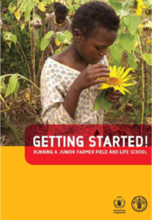WHAT: A guide to setting up, operating and sustaining an agricultural and life skills participatory training program for orphans and vulnerable children (ages 12-18), living in situations of food insecurity. It outlines the following key areas:
1-Planning,
2-Selecting facilitators,
3-Selecting participants,
4-Curriculum development,
5-Training facilitators,
6-Arranging food support,
7-Monitoring and evaluation,
8-Graduation/future activities, and
9-Expansion and scaling up.
WHO: Social and community workers involved in the care and support of adolescents, child-headed households and youth caregivers in communities where HIV has had a strong impact on food security, and/or where child vulnerability exists due to extreme poverty, trafficking or conflict.
WHERE: Globally relevant
WHY: This manual provides a practical guide to empowering adolescents, child-headed households and youth caregivers toward long-term food security through the transfer of both traditional and modern agricultural skills that might otherwise have been lost due to the early death of parents. It also includes life skills trainings, addressing such issues as HIV/AIDS awareness and prevention, gender sensitivity, child protection, psycho-social support, nutrition education and business skills. It is a useful and comprehensive manual for guiding implementation of the experiential learning approach, whereby children learn through observing, drawing conclusions and making informed decisions.

